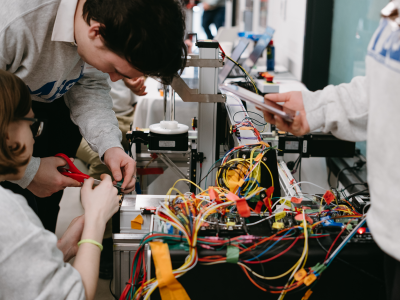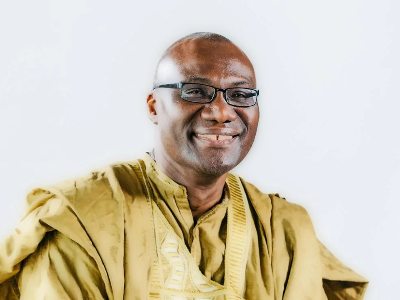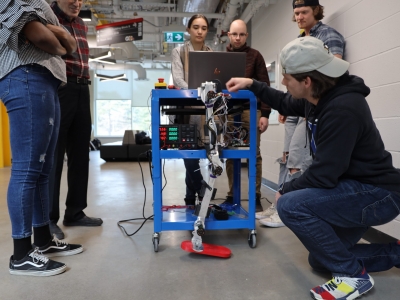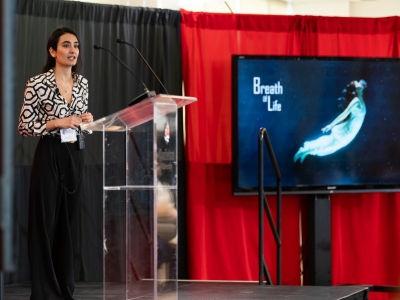The Faculty of Engineering and Design is delighted to acknowledge the following recipients of Carleton University’s 2024 Achievement Awards, which are bestowed annually to recognize the distinction of our professors, instructors and librarians.
Research Achievement Awards
Carleton University Research Achievement Awards are administered by the Office of the Vice-President (Research and International) to recognize outstanding research achievements. The awards were established in 1989 to enhance the quality of research and to recognize research excellence. The recipients’ terms run from May to April.
 Abid Hussain – Department of Civil and Environmental Engineering
Abid Hussain – Department of Civil and Environmental Engineering
Bio-electrochemical systems for carbon recovery and chemical production from organic waste
Organic waste comprises a major fraction of municipal solid waste. The current treatment and disposal methods lead to significant greenhouse gas emissions or yield a product of relatively low value. Bio-electrochemical systems represent innovative technologies capable of converting organic waste to carboxylates which are highly prized as industrial chemicals. This project focuses on the fundamental aspects of the intricate microbial and electrochemical reactions that facilitate carboxylate production in these systems to maximize yields and carbon recovery.
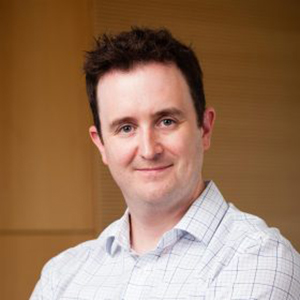 Andrew Harris – Department of Mechanical and Aerospace Engineering
Andrew Harris – Department of Mechanical and Aerospace Engineering
Investigating the Role of Mechanical Forces in Platelet Production
Platelet transfusion is an effective treatment strategy for patients with a reduced platelet count, but it demands a high number of uncontaminated platelets. An intriguing alternative source of platelets to donor blood is to make them synthetically, but current approaches fall short of producing clinically usable platelet counts. This research will take a new perspective by considering the role of mechanical forces in platelet production and will lead to new methods to generate platelets ex vivo.
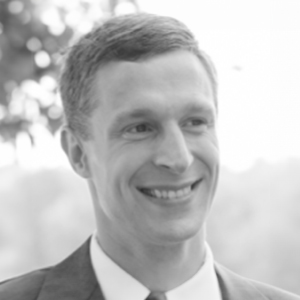 Scott Bucking – Azrieli School of Architecture & Urbanism / Department of Civil and Environmental Engineering
Scott Bucking – Azrieli School of Architecture & Urbanism / Department of Civil and Environmental Engineering
Tiny 2.0: A deeply affordable climate-friendly housing solution
Tiny2.0 builds upon established principles of sustainability, resilience, and affordability to explore cutting-edge concepts within the realm of sustainable and resilient housing solutions (thenorthernnomad.ca). This multidisciplinary research project extends beyond net-zero solutions to incorporate emerging themes like net carbon sequestration and energy trading facilitated by digital blockchain ledgers. Energy storage and trading addresses ongoing issues with the electrical grid such as arbitrage, curtailment, peak emission avoidance and outages due to extreme weather events.
Teaching Achievement Awards
Carleton University Teaching Achievement Awards are administered by the Office of the Provost and Vice-President (Academic) and are intended to enhance the teaching of their recipients and the quality of instruction at Carleton.
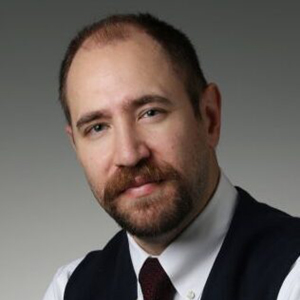 Bora Pulatsu – Department of Civil and Environmental Engineering
Bora Pulatsu – Department of Civil and Environmental Engineering
Advanced Technologies in Interdisciplinary Engineering Education Environment
Teaching conservation engineering and architectural heritage requires highly interdisciplinary course material to address challenges and available solutions. However, conventional engineering education may not necessarily take advantage of technological developments; hence, it is less engaging when assessing complex problems. To this end, a novel experiential learning environment is proposed for students using augmented reality, simulation-based content development and hands-on lab testing. The proposed framework supplements the traditional teaching methods and implements new trends.
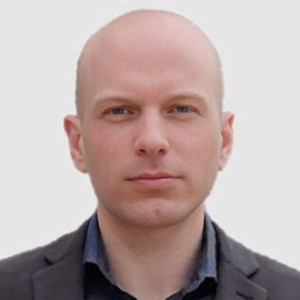 Carlos Rossa – Department of Systems and Computer Engineering
Carlos Rossa – Department of Systems and Computer Engineering
Can Teaching by Demonstration Improve Engineering Graduate Attributes?
Most engineering students discover principles by observing examples, most teaching resources provide a set of rules that students need to memorize and apply. Often, little attention is paid to the question of why these rules exist and what they describe. This project proposes a framework to integrate live demonstrations into modelling and simulation courses to bridge the gap between theory and application. Integrating this form of inductive learning will have a positive and longstanding impact on student performance.
 Alan Steele – Department of Electronics
Alan Steele – Department of Electronics
Developing and Assessing Teamwork Awareness in an Engineering Project Course
This project looks at developing and assessing the teamwork abilities of engineering students in a third-year project. The use of an available online tool for training students on how to evaluate teamwork and provide evaluation of team members, enabling peer feedback within teams. The perceived value of this tool and its feedback will be surveyed after first use in the third-year project and again later in a capstone team project. This can then provide insight into teamwork development.
Personal Achievement Awards
Professional Achievement Awards recognize outstanding professional achievements at Carleton University for librarians and instructors.
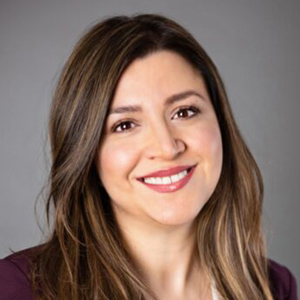 Shoeleh Shams – Department of Civil and Environmental Engineering
Shoeleh Shams – Department of Civil and Environmental Engineering
Shoeleh’s teaching philosophy centers on inspiring passion for learning before effectively transferring knowledge. She strives to create a safe and enjoyable environment that accommodates the diverse learning styles of all students. Her approach involves building trust and strong bonds with students and involving them in the process by incorporating inclusive active learning exercises. Shoeleh’s objective extends beyond content delivery; it prioritizes mentoring and instilling values like integrity and compassion to nurture students’ professional and personal growth.
Contract Instructor Teaching Awards
Contract Instructor Teaching Awards recognize teaching excellence by Contract Instructors at Carleton University.
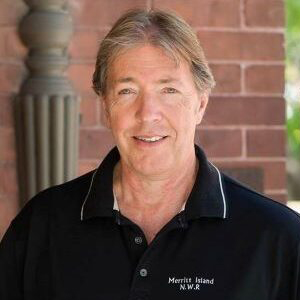 James A. Mountain – Azrieli School of Architecture & Urbanism
James A. Mountain – Azrieli School of Architecture & Urbanism
James’ ongoing interests in teaching students can best be described as experiential learning in research and engagement practices. His focus is on identifying positive initiatives for energizing, empowering, activating downtowns, neighbourhoods, rural and Indigenous communities who are facing economic, social, cultural and environmental challenges. He connects students with real-life conservation and adaptive repurposing initiatives for places that may involve healing from histories of racial exclusion, trauma, and colonialism. Students learn first-hand that the concept of reconciliation as defined and managed by Indigenous communities can be fostered through taking positive action.
Thursday, March 7, 2024 in Architecture, Civil and Environmental Engineering, Competitions and Awards (Internal), Electronics, Faculty, Health, Mechanical and Aerospace Engineering, National Engineering Month Redirects, Research, Sustainability, Systems and Computer Engineering
Share: Twitter, Facebook
